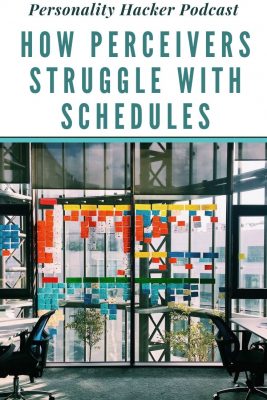Download Episode Here – right click link and select “Save Link As…”
In this episode, Joel and Antonia talk about the struggles Perceivers have with schedules.
In this podcast you’ll find:
- Scrum Board
- Schedule vs. rhythm
- Judgers create the schedule first then the rhythm comes from the schedule
- But for perceivers, we suspect the rhythm comes first, and the schedule evolves around it
- Perceivers can get unrealistic about how much they can get done at any given time, so they struggle with sticking to a schedule.
- They will abandon schedules because they never seem to work.
- When you have an extraverted Judging function higher up in your stack, it is easier for you to keep track of what is happening over a long period of time.
- EPs fixation is unfettered freedom, so schedules can feel like life has no color.
- They may unconsciously sabotage a schedule to maintain their freedom.
- Judgers put a schedule to paper, and it becomes their motivation.
- To check it off the to-do list.
- Perceivers hate To-Do lists.
- Schedules facilitate you to do the things you want to do.
- All of us have stuff we don’t want to do, but it’s the best way to get something done.
- Perceivers – Make peace with your schedule.
- Schedules don’t have to hurt.
- Find what works for you and craft your schedule around it.
- Schedules are a platform for opportunity.
- When you are trying to figure something out, you aren’t sure which rules you can break.
- So, Perceivers may often look more militant about maintaining schedules than Judgers because they don’t know how to adapt if something goes wrong with their schedule.
- Perceivers can tend to forget what they accomplish, too.
- Celebrate the things you accomplish.
- Create anchor events for yourself that are non-negotiable then fit the other things around the anchor events.
- Anchor events may not happen until you find your rhythm.
- Perceivers – Make peace with the schedule and go with the rhythms of your life.
- Go to bed at a decent time, so you have more energy to accomplish things.
- Drink plenty of water
- Exercise
- Eat nutritious food
- Put your shoes on every day
- Judgers need to make sure they don’t have too much energy sapping things in their schedule
- When they were designing Disneyland, there was a patch of grass people kept cutting through, so Disney told them to pave it and create a path.
- Judgers create this Stay off the Grass situation and force themselves into a schedule that isn’t energy efficient.
- Judgers – make sure you aren’t wasting time and effort by shoe-horning yourself into a schedule that is too arduous.
To subscribe to the podcast, please use the links below:
Subscribe with iTunes
Non-iTunes Link
Soundcloud
Stitcher
Google Play
Spotify
Radio Public
PlayerFM
Listen Notes
If you like the podcast and want to help us out in return, please leave an honest rating and review on iTunes by clicking here. It will help the show and its ranking in iTunes immensely! We would be eternally grateful!
Want to learn more?
Discover Your Personal Genius
We want to hear from you. Leave your comments below…



Share:
Podcast - Episode 0295 - Food Choices And Personal Growth
Podcast - Episode 0297 - Cognitive Functions And Time
33 comments
As an INFP, I’m struggling with schedules, and of course it’s very hard to me to be micromanaged at work, but since we set up some rituals (not rules !!!!) at home with my adorable INFJ girlfriend I can breath really intensely and I feel better as ever, and I’m writing again after two terrible years.
After experimenting rituals during several months, I see how more creative I’m because those rituals respect and protect my needs, especially unstructured time without pressure. To me, rituals are now a safe place protected from horrors, in order to not let anymore horrors take the all space during hard times. They can of course be espressed, but never during rituals !
It should be seen as a paradox, but I think it’s absolutely not the case, I feel much less pressure thank to rituals. .
I’m an intj and my ‘schedule’ is simply a routine of what works best for my own rythyms – at a daily, weekly, monthly and yearly level.
From the outside it might look disciplined, but it’s just about knowing myself, recognising my patterns and limitations, and optimising.
Trying to do things that don’t respect my rythyms drains my energy almost completely. It’s not at all sustainable.
Yes, I imagine I probably would be diagnosed with it too! Changes to my diet and sleep hygiene have helped a lot but I will continue to look into various medical interventions to see what else I can do to support my hormonal shifts. Just understanding it better, and not beating myself up for the times when my energy/mood dips, has made a big difference in how I experience it.
You’ve just described PMDD; might be worth it to look into it?
I’m an INFP also and have been diagnosed for it. So my moods shift with my hormones.
I’m a freshly diagnosed INFJ, and I very much agree with the other INJs that resonated with this podcast as fellow intuition/perceiving-dominants. Left to my own devices, I just go into my own mind and don’t get anything done! I also sympathize with the night owl tendencies.
I kind of figured out the anchor points technique on my own, without having a name for what I was doing—in college and grad school, classes were my anchor points; and outside of school, scheduled caretaking duties filled the same function. During and after my school years, I also had part-time secondary jobs that I specifically chose because they were flexible enough to slot in wherever I had free time. As Ty pointed out above, it’s easier for an INFJ to schedule time for the needs and expectations of others, but our personal time tends to get eaten up by other people unexpectedly needing something or by Perspectives demanding some quality time.
Since scheduling is usually addressed in Effectiveness language—breaking down projects into steps, management of time and energy resources, checking off tasks, getting lots of things done with as little wasted time as possible—I was hoping Antonia would have some suggestions for leveraging the Harmony-Accuracy polarity to get one’s life organized, but it sounds like that’s something she struggles with too. I ended up ruminating on the question while walking the dog, and I think the key might be reframing tasks in terms of “what needs must be taken care of or tended to” and “what has to be categorized/sorted” (thank you, Perspectives-Sensation polarity!). I’m fairly comfortable with categorizing since I’ve been in a Perspectives-Accuracy loop for a long time, but as Harmony is my extroverted judging function and my copilot, I’ll probably get the most done by fitting the majority of tasks under that umbrella. For instance, going for more frequent walks is a health need for both the dog and myself; household chores and yard work can be thought of as tending to my home (though I fear anthropomizing my house could lead to crazy old lady syndrome :} ), not to mention making my home comfortable and hospitable to others; and setting aside dedicated Perspectives time would be tending to myself so I’m not too exhausted to deal with the external world.
Now I’m envisioning some kind of kanban-calendar combo (what would that be, a “flex calendar”?) where I can keep track of my anchor points and all the other needs that should be addressed around those time slots. If I lean on Accuracy to color code different categories of needs—such as personal needs, family needs, pet needs, health needs, creative needs, financial needs, etc.—I’d also have an easy way to visualize which need categories might be getting too much or too little attention. I’m actually a little excited about trying this—it speaks to me more than traditional, Effectiveness-based concepts of organization ever have. I just hope that using the term “need” doesn’t qualify as creating fires to put out!
Anyone else have tips or ideas for using Harmony to get organized?